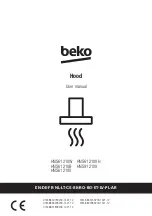
Page 6
IMPORTANT:
A minimum of 8” (20 cm) round (standard for this range hood) must be used to maintain maximum airflow
efficiency.
Always use rigid type metal/aluminum ducts if available to maximize airflow when connecting to provided
duct.
Please use
Duct Run Calculation
below to compute total available duct run when using elbows, transitions
and caps.
ALWAYS, when possible, reduce the number or transitions and turns. If long duct run is required, increase
duct size from 8” (20 cm) to 10” (25.4 cm). If a reducer is used, install a long reducer instead of a pancake
reducer. Reducing duct size will restrict airflow and decrease airflow, thus reduce duct size as far away from
opening as possible.
If turns or transitions are required: Install as far away from opening and as far apart, between 2, as possible.
Minimum mount height between range top to hood bottom should be no less than 28”.
Maximum mount height should be no higher than 33”
It is important to install the hood at the proper mounting height. Hoods mounted too low could result in heat
damage and fire hazard; while hoods mounted too high will be hard to reach and will loose its performance
and efficiency.
If available, also refer to manufacturer’s height clearance requirements and recommended hood mounting
height above range.
Minimum Duct Size:
Round- 8” (20 cm) minimum
•
•
•
•
•
•
•
•
•
•
Duct Run Calculation:
Recommended maximum run
8” (20 cm)
65 ft
Vent piece deduction
Each 90º elbow used
ft
Each 45º elbow used
6 ft
Side wall cap with damper
0 ft
Roof cap
0 ft
Duct Run Calcuation example:
One roof cap, two 90º elbow, and one 45º elbow used:
0 ft + 12 ft + 12 ft + 6 ft = 30 ft used.
Deduct 30 ft from 65 ft, 35 ft maximum available for
straight duct run.
Calculating vent system length
To calculate the length of the system you need, deduct the equivalent feet for each vent piece used in the system
from the recommended maximum duct run.
Содержание FA Series
Страница 19: ...Page 18 Service Note ...
Страница 20: ......






































